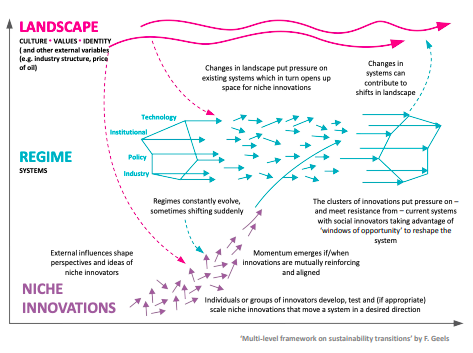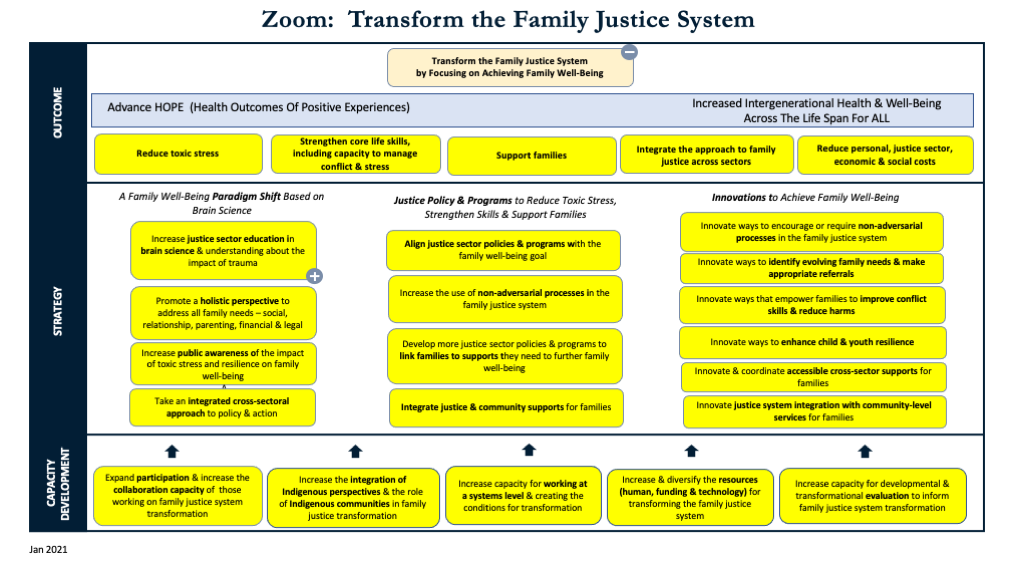Episode 50 (En anglais): Family Law Reform Part III: It’s All About the Children
This podcast is available on your favourite platforms, including Apple Podcasts and Spotify. Subscribe, rate, and leave a comment! Please write us to communications@ciaj-icaj.ca if you wish to receive an email when a new podcast is published.
Episode 50 (En anglais): Family Law Reform Part III: It’s All About the Children
Broadcast Date: March 31, 2022
Summary
In Canada and many common law jurisdictions, there has been a longstanding concern about the family justice system. People who work in the system, families who turn to the family justice system for help, and reports about system reform speak about the crisis in family justice. We are hearing that it is not working for families and in fact, can do more harm than good.
In this third and last episode of a three-part series on “Family Law Reform,” CIAJ’s Executive Director and lawyer Christine O’Doherty is interviewing the Honourable Justice Rodney A. Jerke of the Court of Queen’s Bench of Alberta and Diana Lowe, QC, lawyer and justice system consultant at Re-imagining Justice to discuss:
- the importance of improving the outcomes for families
- why transforming the family justice system is needed and how to achieve this
- the changes that are starting to take place
- the “Seven C’s”: creative, curiosity, committed, community, compassion, cash and brain science (children)
Previous episodes:
Episode #48: Family Law Reform Part I: The Right to a Good Life – With guest Diana Lowe, QC (lawyer and justice system consultant, Re-imagining Justice)
Episode #49: Family Law Reform Part II: Brain Science, Adverse Childhood Experiences, and Resilience – With guests Nicole Sherren, PhD (Principal Consultant & Founder, R2P Solutions) and Diana Lowe, QC (lawyer and justice system consultant, Re-imagining Justice)
Guests
- The Honourable Justice Rodney A. Jerke, Court of Queen’s Bench of Alberta
Justice Jerke has been a justice of the Court of Queen’s Bench of Alberta since March 2011, originally resident in Lethbridge, and more recently in Edmonton. In addition to his sitting duties with the Court, since September 2018 he has been the Court’s Co-Convenor of the Reforming the Family Justice System initiative which is inspiring the re-imagining the family justice system to improve outcomes for children and families. He has served as a Co-Chair of the Court’s Access to Justice Steering Committee, and continues to be an ad hoc member of the Court’s Diversity, Inclusion and Access Steering Committee. Prior to his appointment, Justice Jerke practiced civil litigation in Lethbridge, Alberta. He was a frequent lecturer in trial advocacy and an active member of the Law Society of Alberta. He served as President of the Law Society from 2010-2011 and was also the President of Pro Bono Law Alberta, and the Chair of the Law Society of Alberta Conduct Committee.
- Diana Lowe, QC, lawyer and justice system consultant, Re-imagining Justice
Diana Lowe, QC is a lawyer with 35 years of experience which includes legal practice, research and reform of the civil and family justice systems in Canada, and most recently as Executive Counsel to the Chief Justice of the Court of Queen’s Bench of Alberta. Since retiring from the Court in late 2020, Diana has established a consulting practice – “Re-imagining Justice”. She continues to support the Reforming the Family Justice System (RFJS) initiative in Alberta, and also works with other jurisdictions interested in justice system transformation.
The RFJS is a multi-year, multi-sector collaboration, designed to effect system-wide change in the family justice system in Alberta, based on brain science and Adverse Childhood Experiences. The RFJS is seeking to shift the focus in family justice matters away from adversarial, legal responses, to making supports available to assist families with the social, relationship, parenting and financial issues that arise in family matters. The outcome collaborators are seeking is family well-being, which they define as “Helping Families Thrive”.
Host
-
Christine O’Doherty, Lawyer and Executive Director, CIAJ
Christine O’Doherty has been CIAJ’s Executive Director since 2017. A bilingual lawyer experienced in professional, labour and commercial law, she has contributed to developing and implementing effective government relations and public affairs strategies for a number of major organizations. Ms. O’Doherty has taught at the Faculté de pharmacie de l’Université de Montréal for 14 years, where she was responsible for the implementation of the soft skills curriculum for graduate and undergraduate students. In her spare time she writes fiction.
Resources
– Geels Framework visual, as shared with the RFJS by Mark Cabaj, From Here to There

– Transforming the Family Justice System Strategy Map:
A well-designed strategy map improves the odds of succeeding with large-scale systems change by:
- Helping to organize complex collaborations of many different organizations involved in different, but mutually reinforcing and aligned actions;
- Managing the details of the short-term actions, while allowing all participants to see how the detail fits into the bigger, jointly held vision of the system change that will take longer to achieve;
- Providing a structure that monitors progress on actions and measures outcomes beyond the efforts of one organization.
Like a theory of change or a logic model, a strategy map links aspirations with capacities. Our aspirational goal is to “Transform the Family Justice System by Focusing on Achieving Family Well-Being.” There are a number of outcome strategies at the top of the map, which incorporate the resilience principles, and also our decision to integrate this work across many sectors. We have capacity development strategies at the bottom. And Action Strategies in the center, which reflect the 3 levels of the Geels Framework.
A link to a webinar on Strategy Mapping with Bill Barberg from InsightFormation, Diana Lowe, QC (RFJS) and Jane Morley, QC (A2JBC) “Advancing Your Community’s ACEs & Resilience Strategy” is at: https://improvepophealth.org/advancing-your-communitys-aces

– coParenter
The coParenter platform provides families with a number of tools to help them manage, organize and resolve everyday co-parenting responsibilities, with (or without) the assistance of a coach or mediator. These tools include:
- documented messaging, with a language filter that coaches parents to use appropriate language
- templates and support to create parenting time schedules, which can be incorporated into existing online calendars. This includes regular schedules, vacation schedules and holidays
- tools to reach agreement on issues, activities and schedules
- tracking parenting time
- triage and diagnose issues
- share child-related information
- manage and document expenses
Families can be referred to sign up for coParenter at www.coparenter.com
Perhaps most important, is the overall coaching and empowerment of families that is achieved through the online tool, coaching and mediation process.
– Family Supports
There are 180 Family and Community Support Services throughout Alberta, with the mandate to support families and prevent harm. A list of all of the member organizations in the Family & Community Support Services Association of Alberta is available on the FCSS Association of Alberta website, under Documents and Resources https://fcssaa.org/documents-resources/library/#23-32-wpfd-fcss-program-contact-lists You can choose a list of all organizations, or regional program lists.
– Divorce Magazine
The Divorce Magazine is a free publication that is available on public stands at locations throughout Edmonton and Calgary. The Magazine includes information about a variety of supports and services for families dealing with the challenges of separation and divorce. It is also available online at: https://divorcemagazinecanada.com/magazines
There is an article about the RFJS at pages 5-6 of the current (2021) issue of the magazine, and in each of the past 5 issues.
– Divorce Resource Groups
These are monthly meetings hosted by the publisher of Divorce Magazine, to bring together members of the public who are dealing with separation and divorce, with professionals who can help navigate. For more information see: https://divorcemagazinecanada.com/support
– New Ways for Families
New Ways for Families (NWFF) ran a 3-year pilot in Medicine Hat, which was a collaboration between the Ministry of Justice & Solicitor General, legal and social service practitioners and the Court. The case study of this program showed tremendous value in this approach. Online courses are available to learn about the approach and gain the skills to coach families to better approaches: https://www.highconflictinstitute.com/on-demand-courses
– Office of the Child and Youth Advocate
Alberta’s Child & Youth Advocate (an independent officer of the Alberta Legislature) recently issued a “Statement of Concern” regarding the well-being of children whose families are involved in high-conflict custody disputes. https://www.ocya.alberta.ca/adult/news/child-and-youth-advocate-releases-statement-of-concern/
– Child Welfare
“Journey Home” is a powerful documentary that explores the importance of healing for Indigenous children in the child welfare system. This documentary was produced by Native Counselling Services of Alberta and provides an Indigenous community perspective on inter-generational trauma, and its impacts on children and youth in government care: https://www.youtube.com/watch?v=G-q4VepX4vU
– Family Violence
“Home Fire” is an award winning documentary by Native Counselling Services of Alberta, which explores family violence and restorative justice from an Indigenous perspective.
Impact: https://impact.sagesse.org/ is a province-wide collective impact initiative aimed at eradicating family and sexual violence.
Sagesse: https://www.sagesse.org/ is a domestic violence organization, which also provides the Backbone support for Impact. Sagesse has established domestic violence screening, which mediators, lawyers and other family law professionals can access. This is a process where clients complete a questionnaire, a Sagesse clinical team member reviews the responses, assesses the risk level of domestic violence and power dynamics, and clients receive a follow-up letter or phone call. For more information contact screening@sagesse.org or by phone at 403-234-7337
Safe-at-Home Pilot: This is an innovative program aimed at keeping women and children in the family home (with supports), while providing temporary housing, programs and supports for men who have used family violence. Information about the Safe at Home pilot is available online at: https://www.safeathomeab.ca/
Documentation related to ACEs (Adverse Childhood Experiences)
– ACEs and Outcomes
– ACEs infographic (Robert Woods Johnson Fdn)
– John M. Bryson, Bill Barberg, Barbara C. Crosby & Michael Quinn Patton (2021) Leading Social Transformations: Creating Public Value and Advancing the Common Good, Journal of Change Management, 21:2, 180-202
– Re-imagining the Family Justice System: an introduction to Alberta’s Reforming the Family Justice System initiative, Diana Lowe, QC, September 2021, Vol. 51 Family Law Journal 1156
In All Fairness is a Canadian Institute for the Administration of Justice podcast channel welcoming representatives from the legal community and exploring how we can all contribute to improving the administration of justice in Canada. Legal professionals will benefit from informed discussions on key issues, essential knowledge and insights to strengthen their practice.
Visit the upcoming programs section of our website or the online library, or contact us if you want to learn more and expand your skills. Numerous programs are available, including customized training.
Questions and suggestions are always welcome. Please write to communications@ciaj-icaj.ca
